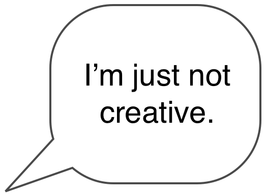 Those of us who were typically developing children pretended, played, danced, and colored and cut and pasted and taped with abandon. I see it every day with my own children ages 3 and 5. For most of us, supportive adults let all of that creativity happen, and even encouraged it. Creativity was part of our early development. It was a process. It wasn’t about the output. I don’t know anyone who would look at the drawings or collages or sculptures of a 3 or 5 year old and evaluate whether or not they are creative: “No, honey, the way you taped that pipe cleaner next to that scribble mark is not very creative.” It seems odd to even conceive of making such a value judgment because most of us appreciate a child’s process, their exploration of materials, and early efforts at self-expression. That’s what kids are supposed to do. Somewhere along the way, however, we do start judging. We start telling kids that this creativity of theirs is either good or bad - or, more specifically, they are good or bad at it – rather than reinforcing it as a valuable part of who they are and who they are becoming. We do this because we start judging their creativity as a product and lose the beauty and necessity of the process. In doing so, we actually push our kids away from the creative process as they get older. To make matters worse, we also start to evaluate good or bad creativity relative to very specific and finite mediums. So, the kid who can draw or play an instrument is told he is creative. The kid who loves math or history or even science, on the other hand, is at least by contrast, if not explicitly, told he is not. Creativity perversely then becomes the exclusive realm of the arts. As a result, we again push most of our kids away from the creative process. Creativity is for some and not others. Most of us have no idea how we have used creativity in a way that hurts the very idea we value. We see how “creative” people question, deconstruct, or synthesize things in ways that are unique. We appreciate ways that they interpret and express the world. But, we have lumped this all into a generic term. We should be more explicit about what we value in creativity. We should tell people we appreciate how they thought about something, that their question was great. We should ask them how they came to think of or express an idea in a way we hadn’t thought of. We should celebrate and ask about their process for learning or organizing new information. We should try to understand how and where they arrived at some kind of divergent thinking. Basically, we should be more creative about how we think about, acknowledge, and invest in creativity. I understand why so many adults say that they aren’t creative. I just don’t buy it. We’ve been brainwashed by an evaluative and arbitrarily narrow use of the word. We need to reclaim creativity in each of our lives and work. We need to stop seeing creativity as the developmental realm of the child or the specific domain of the arts. Creativity is within all of us, and all of us will be better off when more of us accept it, and put it into action.
0 Comments
Leave a Reply. |
Categories
All
Archives
April 2024
|
 RSS Feed
RSS Feed